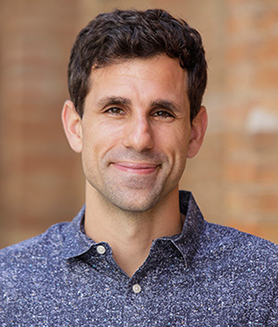2022 Judith H. Greenberg Early Career Investigator Lecture
Artificial Intelligence Approaches for Antibiotic Discovery
 Credit: Martí E. Berenguer.
Credit: Martí E. Berenguer.César de la Fuente, Ph.D.
Presidential Assistant Professor, Departments of Bioengineering, Microbiology, and Psychiatry
University of Pennsylvania
Lecture followed by Q&A session
Research Summary
Innovations in artificial intelligence may help to replenish our arsenal of effective drugs, such as those to treat antibiotic-resistantbacterial infections. Since their discovery in the early 1900s, antibiotic medicines have saved countless lives, but their extensive use has resulted in some bacteria developing resistance to them—meaning our current antibiotics no longer work to treat some infections. To effectively probe antibiotic design and discovery using computational approaches, researchers must first program computers to sort through the many characteristics of molecules and determine which properties optimize antimicrobial activity.
Dr. César de la Fuente has trained a computer to select for molecular structures that interact with bacterial membranes, leading to artificial antimicrobials that kill bacteria both in vitro and in research organisms. Additionally, his lab has applied pattern recognition algorithms to mine the human proteome, identifying thousands of possible antibiotics encoded in proteins throughout the human body. His research group has also used computational tools to successfully reprogram venoms into potential novel antimicrobials.
Biographical Sketch
Dr. César de la Fuente, a Presidential Assistant Professor at the University of Pennsylvania, leads the Machine Biology Group, which aims to combine the power of computers and biology to help prevent, detect, and treat infectious diseases. He received his Ph.D. in microbiology and immunology from the University of British Columbia and then worked as a postdoctoral associate at the Massachusetts Institute of Technology (MIT). Dr. de la Fuente has an NIGMS Maximizing Investigators’ Research Award grant supporting his work combining chemical and computational tools for predictive models of microbiome communities. He has received wide recognition for his pioneering research that spans over 100 publications, including the MIT Technology Review naming him one of the world’s top innovators for “digitizing evolution to make better antibiotics,” the Langer Prize, the Princess of Girona Prize, and the American Society for Microbiology Award for Early Career Applied and Biotechnological Research.
References
Cesaro A, Torres MDT, Gaglione R, Dell’Olmo E, Di Girolamo R, Bosso A, Pizzo E, Haagsman HP, Veldhuizen EJA, de la Fuente-Nunez C, and Arciello A. Synthetic antibiotic derived from sequences encrypted in a protein from human plasma. ACS Nano. (2022) doi: 10.1021/acsnano.1c04496.
Torres MDT, Melo M, Crescenzi O, Notomista E, and de la Fuente-Nunez C. Mining for encrypted peptide antibiotics in the human proteome. Nature Biomedical Engineering. (2022) doi: 10.1038/s41551-021-00801-1.
